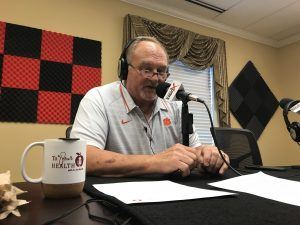

Attention Deficit Disorder (ADD) – Episode 37, To Your Health With Dr. Jim Morrow
On this edition of “To Your Health,” Dr. Morrow discusses attention-deficit disorder: how to recognize it, how a doctor diagnoses it and treatment options. “To Your Health” is brought to you by Morrow Family Medicine, which brings the CARE back to healthcare.
About Morrow Family Medicine and Dr. Jim Morrow
Morrow Family Medicine is an award-winning, state-of-the-art family practice with offices in Cumming and Milton, Georgia. The practice combines healthcare information technology with old-fashioned care to provide the type of care that many are in search of today. Two physicians, three physician assistants and two nurse practitioners are supported by a knowledgeable and friendly staff to make your visit to Morrow Family Medicine one that will remind you of the way healthcare should be. At Morrow Family Medicine, we like to say we are “bringing the care back to healthcare!” Morrow Family Medicine has been named the “Best of Forsyth” in Family Medicine in all five years of the award, is a three-time consecutive winner of the “Best of North Atlanta” by readers of Appen Media, and the 2019 winner of “Best of Life” in North Fulton County.
Dr. Jim Morrow, Morrow Family Medicine, and Host of “To Your Health With Dr. Jim Morrow”
 Dr. Jim Morrow is the founder and CEO of Morrow Family Medicine. He has been a trailblazer and evangelist in the area of healthcare information technology, was named Physician IT Leader of the Year by HIMSS, a HIMSS Davies Award Winner, the Cumming-Forsyth Chamber of Commerce Steve Bloom Award Winner as Entrepreneur of the Year and he received a Phoenix Award as Community Leader of the Year from the Metro Atlanta Chamber of Commerce. He is married to Peggie Morrow and together they founded the Forsyth BYOT Benefit, a charity in Forsyth County to support students in need of technology and devices. They have two Goldendoodles, a gaggle of grandchildren and enjoy life on and around Lake Lanier.
Dr. Jim Morrow is the founder and CEO of Morrow Family Medicine. He has been a trailblazer and evangelist in the area of healthcare information technology, was named Physician IT Leader of the Year by HIMSS, a HIMSS Davies Award Winner, the Cumming-Forsyth Chamber of Commerce Steve Bloom Award Winner as Entrepreneur of the Year and he received a Phoenix Award as Community Leader of the Year from the Metro Atlanta Chamber of Commerce. He is married to Peggie Morrow and together they founded the Forsyth BYOT Benefit, a charity in Forsyth County to support students in need of technology and devices. They have two Goldendoodles, a gaggle of grandchildren and enjoy life on and around Lake Lanier.
Facebook: https://www.facebook.com/MorrowFamMed/
LinkedIn: https://www.linkedin.com/company/7788088/admin/
Twitter: https://twitter.com/toyourhealthMD
The complete show archive of “To Your Health with Dr. Jim Morrow” addresses a wide range of health and wellness topics, and can be found at www.toyourhealthradio.com.
Dr. Morrow’s Show Notes
What is attention-deficit disorder (ADD)?
- Attention-deficit disorder (ADD) is a group of behaviors.
- It used to also be called attention deficit disorder (ADD).
- ADD is common in children and adults.
- People who have ADD have trouble paying attention in school, at home, or at work.
- Even when they try to concentrate, they find it hard to pay attention.
- Children who have ADD may be more active or impulsive than what is typical for their age.
- These behaviors cause problems in friendships, learning, and behavior.
- For this reason, children who have ADD are sometimes seen as being “difficult” or as having behavior problem
- Some people who have ADD may have other conditions as well.
- These could include learning disabilities,
- anxiety,
- depression,
- oppositional defiant disorder (ODD),
- bipolar disorder,
- and Tourette syndrome.
Symptoms of attention-deficit disorder (ADD)
- People who have ADD have
- difficulty organizing things,
- listening to instructions,
- remembering details,
- and/or controlling their behavior.
- This can make it difficult to get along with other people at home,
- at school,
- or at work.
- A person with ADD who has difficulty paying attention will have 6 or more of the following symptoms:
- Has difficulty following instructions.
- Has difficulty keeping attention on work or play activities at school,
- work,
- and home.
- Loses things needed for activities at school,
- work,
- and home.
- Appears not to listen.
- Doesn’t pay close attention to details.
- Seems disorganized.
- Has trouble with tasks that require planning ahead.
- Forgets things.
- Is easily distracted.
- A person with ADD who is hyperactive or impulsive will have at least 6 of the following symptoms:
- Fidgety.
- Runs or climbs inappropriately.
- Can’t play quietly.
- Blurts out answers.
- Interrupts people.
- Can’t stay in seat.
- Talks too much.
- Is always on the go.
- Has trouble waiting his or her turn.
What causes attention-deficit disorder (ADD)?
- People who have ADD do not make enough chemicals in certain areas in the brain that are important for organizing thoughts.
- Without enough of these chemicals, the organizing centers of the brain don’t work well.
- This is thought to be the cause of ADD.
- The shortage of chemicals may be due to a person’s genes (research shows that ADD is more common in people who have
- a close family member with the disorder),
- environment,
- or physical development.
- Recent research also links smoking and other substance abuse during pregnancy to ADD.
- Exposure to environmental toxins, such as lead, can also be a factor.
How is attention-deficit disorder diagnosed?
- A doctor will be better able to diagnose ADD when getting information about your child’s behavior.
- It may take information from several people who know your child (teachers, daycare providers).
- Your doctor also may have forms or checklists that you and your child’s teacher can complete.
- This will help you and your doctor compare your child’s behavior with other children’s behavior.
- Unfortunately, many people try to diagnose themselves by using a quiz or a checklist they find in a magazine or see on TV.
- However, it’s best to see your doctor.
- Some of the questions your doctor may ask you or about your child include:
- Do you have problems with paying attention and being hyperactive?
- Do you have a hard time keeping your temper or staying in a good mood?
- Do you have problems staying organized or being on time?
- Do these problems happen to you at school, work and at home?
- Do family members and friends see that you have problems in these areas?
- Do you have any physical or mental health problems that might affect your behavior?
- (Your doctor may give you a physical exam and do tests to see if you have any medical problems with symptoms that are like ADD.)
- Your doctor will probably want to test your child’s vision and hearing if these tests haven’t been done recently.
- A person diagnosed with ADD will have had symptoms for at least 6 months.
- If your doctor is uncertain about an ADD diagnosis, he or she may want to give you or your child medicine to see if it makes a difference.
- However, a trial of medicine alone is not enough to diagnose ADD.
- Also, it might be hard for your doctor to tell if your child has ADD.
- Many children who have ADD aren’t hyperactive in the doctor’s office.
- Your doctor may ask you to fill out a questionnaire regarding your child’s behavior patterns.
- Eventually, your doctor may want your child to see someone who specializes in children’s behavior.
- The American Academy of Family Physicians (AAFP) recommends that any child 4 through 18 years of age should be evaluated for ADD if they have
- academic or behavioral problems,
- and symptoms of inattention,
- hyperactivity,
- or impulsivity.
Can attention-deficit disorder (ADD) be prevented or avoided?
- ADD cannot be prevented or avoided.
- However, doctors believe that avoiding smoking and substance abuse during pregnancy can lower the baby’s risk of developing ADD.
- Still, there’s no guarantee that doing everything right during pregnancy will protect a baby from developing ADD.
- Additionally, exposure to environmental toxins, such as lead, also can be a risk factor for ADD.
Attention-deficit disorder (ADD) treatment
- Some of the medicines used to treat ADD are called psycho-stimulants.
- They include Ritalin,
- Adderall,
- Concerta,
- Vyvanse
- and a few others.
- These medicines have a stimulating effect in most people.
- However, they have a calming effect in people who have ADD.
- These medicines improve attention and concentration
- and decrease impulsive and overactive behaviors.
- Your doctor may consider other non-stimulant medicines, such as
- clonidine,
- desipramine,
- imipramine,
- and bupropion.
- All medicines have side effects.
- Psycho-stimulants may decrease your appetite and cause a stomachache or a headache.
- The loss of appetite can cause weight loss in some people.
- This side effect seems to be more common in children.
- Some people have insomnia (trouble sleeping).
- Other possible side effects include fast heartbeat, chest pain, or vomiting.
- To avoid or reduce the side effects of psycho-stimulants, follow these tips:
- Use the lowest possible dose that still controls the hyperactivity or inattention.
- Your doctor will work with you to find the right dose.
- Take the medicine with food if it bothers your stomach.
- Ask your doctor if you can skip the medicines on the weekends.
- Offer healthy snacks to children who lose weight while taking medicine for ADD.
- Take the medicine 30 to 45 minutes before a meal.
- Lunchtime doses can be given at school for some children.
- If your child can’t take this medicine at school, tell your doctor.
- He or she might suggest a long-acting form of the medicine instead.
- If you are taking the long-acting form of this medicine, do not crush, break, or chew it before swallowing it.
- It’s important to take the medicine the way your doctor prescribes it.
- Follow your doctor’s advice, even if you think the medicine isn’t working.
- Medicines used to treat ADD have been shown to improve a person’s ability to do specific tasks.
- This includes paying attention or having more self-control.
- The length of time a person will need to take medicine depends on each person.
- Some people only need to take medicine for 1 to 2 years.
- Others need treatment for many more years.
- In some people, ADD may continue into adolescence and adulthood.
- People who have ADD should be checked regularly by their doctors.
- If your child has ADD, your doctor may suggest that he or she take a break from his or her medicines once in a while to see if the medicine is still necessary.
- School breaks or summer vacation might be best.
- AAFP suggests several treatment recommendations.
- Preschool-aged children (4-5 years of age) should be treated with behavior therapy as the first line of treatment.
- The medicine methylphenidate may be prescribed if behavior treatment does not provide significant improvement.
- This medicine also should be prescribed if ADD is interfering with the child’s friendships,
- home,
- and school life at a moderate to severe level.
- Elementary school-aged children (6-11 years of age) should be treated with FDA-approved medicine for ADD and behavioral therapy.
- Adolescents (12-18 years of age) should be treated with FDA-approved medicine for ADD and may be treated with behavioral therapy.
- In all cases, medicine doses should be measured and adjusted to achieve maximum benefit with few adverse effects.
Living with attention-deficit disorder (ADD)
- Symptoms of ADD often get better as children grow older and learn to adjust.
- Hyperactivity usually stops in the late teenage years.
- But about half of children who have ADD continue to be easily distracted, have mood swings, hot tempers, and are unable to complete tasks.
- Children who have loving, supportive parents or guardians who work together with school staff, mental health workers, and their doctor have the best chance of becoming well-adjusted adults.
- Children who have ADD may be difficult to parent.
- They may have trouble understanding directions.
- Their constant state of activity can be challenging for adults.
- Some children benefit from counseling or from structured therapy.
- Families may benefit from talking with a specialist in managing ADD-related behavior and learning problems.
- Children who have ADD also tend to need more structure and clearer expectations.
- You may need to change your home life a bit to help your child. Here are some things you can do to help:
- Make a schedule.
- Make simple house rules.
- Make sure your directions are understood.
- Reward good behavior.
- Make sure your child is supervised all the time.
- Watch your child around his or her friends.
- Set a homework routine.
- Focus on effort, not grades.
- Talk with your child’s teachers.
What about Adult ADD?
- Adults may have ADD as well as children.
- This is a relatively new way of thinking.
- Previously, many physicians felt that adults with symptoms like those of ADD were due more to depression and anxiety than ADD.
- This thinking has changed somewhat.
- An adult with symptoms of ADD also needs to be tested in order to begin treatment.
- Treatment is almost always some form of medication, usually the stimulants.
- Untreated ADD can present as severe anxiety. It is important to make the distinction.














